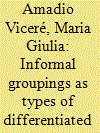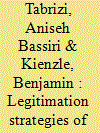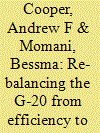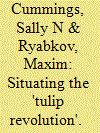|
|
|
Sort Order |
|
|
|
Items / Page
|
|
|
|
|
|
|
| Srl | Item |
| 1 |
ID:
190065


|
|
|
|
|
| Summary/Abstract |
Although informal groups of member states often steer EU foreign policy, existing scholarly literature does not offer an overarching theoretical approach to account for their causes and their different types. This article conceptualizes informal groupings and offers a theoretical approach that explains their occurrence in EU foreign policy. It claims that while disagreements among member states and the lack of EU capacity are the main causes of informal groupings, the combination of these two factors over time and across different policy issues determines the emergence of specific types of informal groupings in EU foreign policy. Indeed, evidence from Kosovo, Libya, and Syria shows that different types of informal groups addressed various policy issues by replacing, complementing and/or supporting corresponding EU policies. Nonetheless, as these groupings lack central guidance and accountability mechanisms, they are not a panacea for EU foreign policy.
|
|
|
|
|
|
|
|
|
|
|
|
|
|
|
|
| 2 |
ID:
174712


|
|
|
|
|
| Summary/Abstract |
The European Union has seen the rise of informal groups of states as an increasingly important governance mechanism within its formal structures. Such groups can make decision-making processes more efficient, but they also suffer from a substantial lack of legitimacy in the eyes of the non-members. In this article, we examine how informal groups overcome this fundamental dilemma between efficiency and legitimacy and sustain themselves at the forefront of important policy areas. To this end, we trace the development of what we argue to be a particularly useful case: the E3 directoire in the nuclear negotiations with Iran. The empirical results point to new insights into how directoires – and informal groups in general – can use different types of legitimation strategies to gain and maintain legitimacy. More specifically, the E3 implemented three successive legitimation strategies – detachment, co-optation and integration – using different types of legitimacy sources, in particular problem-solving, institutional adjustments and fostering institutional and policy congruence.
|
|
|
|
|
|
|
|
|
|
|
|
|
|
|
|
| 3 |
ID:
130703


|
|
|
|
|
| Publication |
2014.
|
| Summary/Abstract |
This article contributes to the literature on global governance, legitimacy, and small states through a detailed analysis of the Global Governance Group. It examines in particular the operational impact and wider conceptual implications of the 3G's collective diplomatic efforts on the Group of 20. By engaging in a reconfigured form of informal multilateralism, the article finds that the 3G has been and is capable of shaping the global agenda with respect to the G-20 in a way that is both more inclusive and connected with existing institutions, especially the United Nations. Through this initiative, this group has effectively recalibrated the existing narrative about small states, the G-20, and global governance-shifting it from the paradigm of efficiency to one of legitimacy.
|
|
|
|
|
|
|
|
|
|
|
|
|
|
|
|
| 4 |
ID:
085528


|
|
|
|
|
| Publication |
2008.
|
| Summary/Abstract |
The authors assess various writings on the 'coloured revolutions' more generally and the 'Tulip Revolution' specifically. They place this scholarship into three broad categories: an assessment of the Akaev years from a democratization and state-building perspective; the nature of and relationship between formal and informal institutions prior to and after March 2005; and, finally, the domestic and international factors behind mobilization. These correspond broadly to the three areas of enquiry by the contributors to this collection.
|
|
|
|
|
|
|
|
|
|
|
|
|
|
|
|
|
|
|
|
|